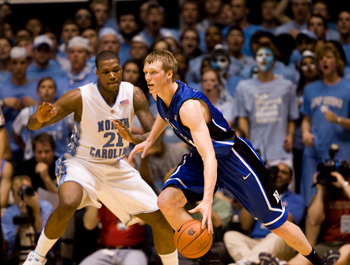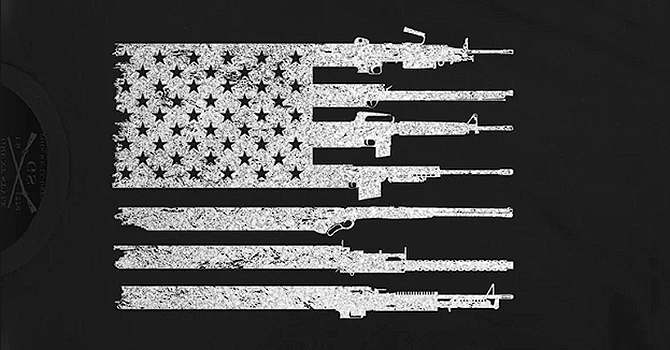Will Blythe is the author of “To Hate Like This Is to Be Happy Forever: A Thoroughly Obsessive, Intermittently Uplifting, and Occasionally Unbiased Account of the Duke-North Carolina Basketball Rivalry.”  As the title suggests, the book matches the intensity of other books on great sports rivalries, but adds a dollop of humor and a writer’s touch such books often lack. Blythe -- a rabid UNC fan who grew up in Chapel Hill, N.C. -- is freelance writer and a former literary editor at Esquire. He lives in New York.
As the title suggests, the book matches the intensity of other books on great sports rivalries, but adds a dollop of humor and a writer’s touch such books often lack. Blythe -- a rabid UNC fan who grew up in Chapel Hill, N.C. -- is freelance writer and a former literary editor at Esquire. He lives in New York.
In an interview with Faith & Leadership, Blythe talks about the particular rivalry he loves and the habits and practices required to be an elite coach, player and fan.
Q: Much of your book is propelled by your admission that you still yell at the television. Why?
I suspect that yelling at the television is a form of ventilation that purges the spiritual toxins from me and insures my psychic well-being. After games, I often feel emptied out. Of course, the room I’ve been watching in can also be emptied out. This can be lonely following a loss. On the other hand, I fear that such ranting may represent a profound failure of impulse control of the same sort that results in murder, assault and Coach K-baiting.
I asked the Buddhist scholar Robert Thurman whether my game-watching tendencies might result in my being reincarnated as an insect or a monkey or a baying coyote on the edge of some lonesome Western suburb. He answered that, indeed, there was some danger in that. I’ve had to weigh my intense fandom against the possibility that I will one day be crouched on all fours out in the desert scrub, barking with longing at a mystifying moon.
For many of us, games become inchoate contests between differing values that we imagine represented by the competing teams. The games satisfy or disappoint our sense of virtue as members of the “right” group. In that sense, the games are not just games -- they’re morality plays.
But I’d rather not take such a philosophical stance on game night, all right?
Q: What did you learn about the discipline, habits and practices necessary for players to compete at the level of Duke and Carolina?
Success at that level requires players to approach basketball like a job. The practices and video sessions alone take hours. The players also lift weights and do additional drills on their own time. Then they have to do their course work. They also have to learn to mesh their own ambitions and particular talents into those of a larger group, often subordinating gifts that have won them acclaim (indeed, scholarships) for the sake of the team. That can be psychologically brutal.
Q: How would you characterize the way each coaching staff works to motivate its players, and how has this changed over the years?
The prevailing view seems to be that a generation or two ago, players would run through a plate-glass door if the coach suggested they do so. Modern players would apparently prefer the coach run through the plate glass door to make sure it’s safe and then post it on YouTube. I suspect that both Roy Williams and Mike Krzyzewski feel they have to be better psychologists than they used to be, that players are a bit more fragile, far less willing to tolerate the General Patton shenanigans of coaches like the Great Chair-Thrower Bobby Knight.
That said, I’ve seen Roy Williams ride players in practice pretty hard and throw a few off the court. At Duke, J.J. Redick told me with a sly grin that Coach K had questioned his manhood in words that Redick was not willing to fully repeat. This didn’t seem to bother Redick but I got the sense that Shavlik Randolph did not adjust so well to the raw particulars of manhood-questioning.
[Former UNC coach] Dean Smith still strikes me as ideal in having had high expectations of his players while still treating them respectfully -- as human beings first, players second. Though [former UNC player and assistant coach] Phil Ford once told me that Dean Smith didn’t need to say anything when he was disappointed with Ford’s play, that he could chill him to the bone with just a simple look.
Q: Can you see a relationship between practice and performance?
I see a greater relationship between having the best players and playing better on game day.
Q: How does each of the great coaches you got to know use storytelling as part of their leadership?
I think great coaches know how to frame a season as a narrative of some sort, whether of vengeance, comeback, fulfillment of destiny, survival, endurance, even ultimate acceptance that there are things in this world bigger than basketball. They animate their players with a conviction that the string of games they play from fall into spring has a larger meaning.
Coaches like to retail their favorite stories, of course, as a way of imparting wisdom, sometimes to the eyerolling of players.
Coach K shared this parable with me when we talked in his old office in the bowels of Cameron Indoor Stadium: “Get on the right bus,” his mother used to tell him.
“I know which bus to get on, Mom,” he’d tell her. “I know how to get around Chicago.”
“No, no, no, Mike. I’m not talking about the CTA -- Chicago Transit Authority. I mean if you get on someone else’s bus, make sure that person is good. Sometimes, people driving that bus will take you places you’ve never been before. And other times, you will drive the bus. Make sure you only allow good people on the bus. And you will take people to the good spots.”
At first, this homily struck me as remarkably slight. And yet, I’ve remembered it, thought about it, and come, despite my own eyerolling, to agree with its seemingly simple premise. The Buddhist teacher Sakyong Mipham puts it similarly, if a tad more concisely: “Nonvirtuous companions are like termites that eat away our noble qualities.”
Q: What makes a top player into a leader on the floor?
Leaders are not necessarily the best players. I think of David Noel for UNC during the 2005-2006 season. Or of Bobby Frasor last season. They often are players who maximize their talent and put it solely at the service of their teammates. A premature reckoning with their deficiencies as basketball players may be a factor in making them leaders. It’s as if they discover the value of a larger goal in the diminishment, relatively speaking, of their individual possibilities.
When the leader is also the player with the most talent, it seems to me that his leadership can often be intolerant. Michael Jordan comes to mind here. That’s not to say I wouldn’t want Michael Jordan on my team. But I don’t think I’d want him critiquing my game. I have the sense that some extremely gifted players don’t make good leaders because their talent is so outsized that they cannot sympathize with the deficiencies of lesser players.
Q: Where do you get your ear for description? Mike Dunleavy’s three-pointers fall “cleanly through the hoop and stab me in the heart like the sneakiest cheatin' girlfriend." Sean May’s hands were so gentle that "Watching him shoot was akin to watching a bear dine on salmon with a knife and fork -- such unexpected refinement captured one's notice."
I’d blush if I could. I don’t really know the answer to that question, other than to speculate that it has something to do with having a sense of play not unlike that of someone horsing around with trick shots during a backyard game of H.O.R.S.E.
Q: What sorts of habits and practices do you engage in as a storyteller? How do you observe what you’re going to write about? How do you then get it on paper?
I’m always writing down things -- conversations overheard on the subway, stray thoughts, story ideas, lines of dialogue, scenes, names, quotations from my reading -- often times on napkins and newspapers and subscription cards, even on my skin at paperless moments. Sooner or later, either these items themselves, or what I’ve written on them, end up in notebooks, where the hope is that I will someday plunder them.
If I’m reporting a story, I generally like to hang back and disappear. But there have been stories where it seemed essential to me to confront a subject, as when I was writing about the neo-Nazi William Pierce, author of the scabrous “Turner Diaries,” and I felt the need to draw a distinction between our beliefs on behalf of my own self-respect. There are times when invisibility suits a journalist; there are times when it seems corrupt.
Janet Malcolm is right to say that the act of journalism is akin to seduction. And there are some people you feel queasy about seducing. As for getting stories down on paper -- patience, sir. Waiting like a hunter in a blind is essential, waiting for a sort of electric feeling in the body signaling the possible approach of a halfway decent sentence that may have something to do with the subject at hand. Lots of sitting. And then the sense that something is about to happen. Hopefully, then that something happens. And you end you end up writing your way through a piece, surge by surge, riff by riff.
Q: Is basketball a sort of religion for you? Should fans feel guilty when it is for them?
Following and indeed playing basketball have afforded me an approach to the ecstatic that my Presbyterian boyhood stinted on.
However, my occasional Sunday forays to the gospel shouting and falling-outs at Terrells Creek Missionary Baptist Church west of Chapel Hill were another matter. “This is how white people behave when they’re watching basketball,” I thought, surveying the black congregation catching the spirit, jumping up and down, imploring heaven, weeping, wailing, laughing. The Holy Spirit running through a church makes worshippers look like they’re doing the wave.
And if I recall Corinthians 13:11 correctly -- which if I do, I owe to that unecstatic Presbyterian boyhood -- while there is a time to give up childish ways, Paul also meant to tell the Corinthians -- who would one day rule European basketball -- that there is a time to bring those childish ways out of storage. Like during basketball season.
Q: Much of your reflection runs to the theological. Your mother “tried to placate the New England God of her youth, that stern Congregationalist who frowned upon too much celebration." I take it your view of God allows greater revelry?
The Jewish tractate Kiddushin addresses this when Rabbi Hizkiyah and Rabbi Kohen [say] in the name of Rav: “In the future, one will have to give account for all that which he saw but did not eat.”
I’m with the rabbis here. And also with my late father’s particular God, who apparently wanted us to drink a lot of Scotch, turn cartwheels in the living room and frolic with our relatives and other like-minded revelers in the interest of love and happiness. I remember my father coming home from church one Sunday many years ago, complaining about the dour sermon. “Why do they have to leave the joy out?” he asked. He liked celebratory hymns, he rejoiced in bringing in the sheaves, whatever sheaves were.
Q: Do you advise praying for victory? After all, you write in your book, "It was clear to my 11-year-old mind that if God didn't care about who won the basketball game, then who was to say He [cared] about an individual sparrow falling from the sky?"
When it comes to victory, I think good recruiting is probably more important than prayer.
Q: What surprised you most working on this book?
I was struck by how the hatred between the two programs existed most strongly -- and perhaps only -- the farther you got from the players and their families and the coaches. To be fair, I don’t know that this surprised me but it sure did strike me.
Q: What happens to Duke and Carolina respectively this year?
Both teams seem like they will be about as good as their backcourts allow. I worry that Carolina won’t be able to shoot very well and that Duke will. On the other hand, I suspect that the Tar Heels will be a very good defensive team and that Duke may not.
At any rate, I’m reasonably certain I will be watching their encounters with my usual interest. Hide the dogs and the children.







